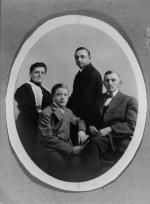| 2 |
SMALL-TOWN BOY
Frank Buchman was born in Pennsburg, Pennsylvania, on 4 June 1878. The town had one main street of plain brick houses, a Lutheran Reformed church, a general store, a millinery shop, a small cigar factory, a hotel, and a newly-built railway station patronised by four passenger trains and two freights a day. Its 1,200 inhabitants were virtually all Pennsylvania Germans - the name by then corrupted to Pennsylvania Dutch - most of them descended from settlers who had trekked up the valleys from Philadelphia during the previous century and a half. To the east lay the Perkiomen River, named after an Indian chief, and all around stretched the rolling, fertile farmland which had made Pennsburg a comfortable and prosperous township.
Like the rest of Pennsylvania Dutch society, Pennsburg was a conservative and intensely close-knit place. 'I could lie awake at night', said Buchman later, 'and think who lived in every house from one end of Pennsburg to the other.' German, in a dialect which sounded like a mixture of Swabian and Swiss German, was still the language of everyday speech, and to the end of his days Buchman's father was more at home with German than with English. Most of the area's local newspapers were printed in German, sermons were delivered in German and many of the customs of the homeland survived intact. At Christmas the trees were heavy with red apples and cookies decorated with red sugar; on Shrove Tuesday there were special doughnuts, known as Fawsanochdkucha (Fastnachtkuchen). It was all part of a culture quite different from anything outside the area.

The people, too, strongly resembled their prototypes in Europe. They were serious, dutiful and apt to take a sombre view of life, and their morality embodied a keen appreciation of the value of material things. They believed in hard work, frugality and a scrupulous honesty in their dealings. Buchman once described them as ‘people who are conservative, stubborn, suspicious. Not to excel in something is just too bad.’
Abstinence from alcohol was regarded as preferable, and the only permissible vice was overeating. To the Pennsylvania Dutch, indeed, the delights of the table were among the principal joys of life. This was the land which originated the waffle and shoo-fly pie, the land of chicken corn soup and dandelion salad. Everyone was expected to provide a good meal at short notice and anyone who was not a good trencherman was apt to be suspect.
3
Photo: The Buchman family - Franklin and Sarah, their son Frank and adopted son Dan.
©Buchman Archive/MRA Productions